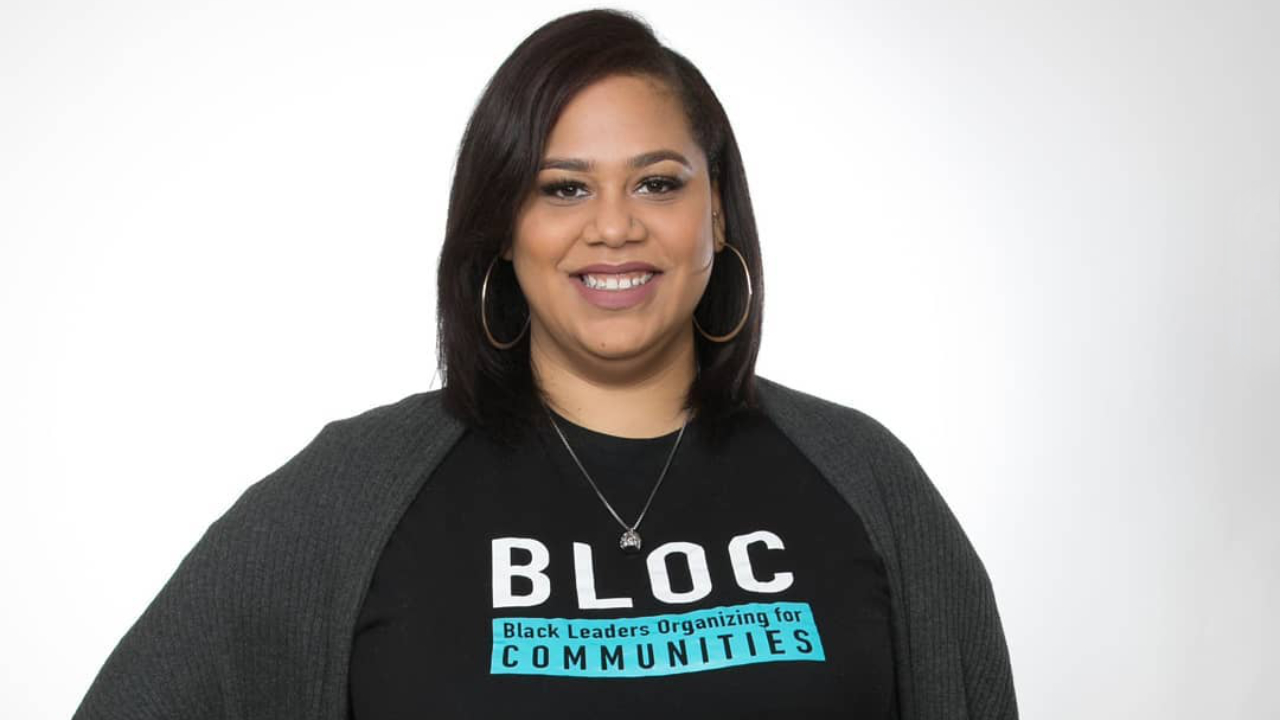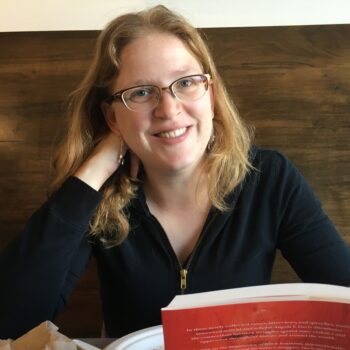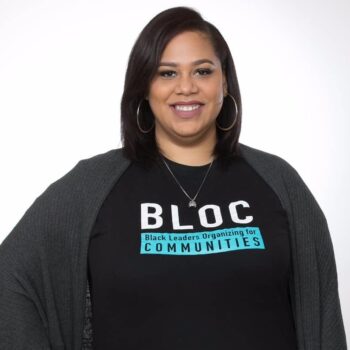Angela Lang is co-founder and Executive Director of Black Leaders Organizing for Community (BLOC) in Wisconsin. Prior to BLOC, Angela worked as an organizer and political director for SEIU and as political director of For Our Future/Wisconsin in 2016. All told, she has been organizing for ten years. This interview has been lightly edited for readability.
After the 2016 election, numbers started coming back that Donald Trump won Wisconsin by only 22,000 votes. People started saying, those votes could have come out of Milwaukee. That was just code for “if those black people had shown up we wouldn’t be here.” And that narrative I felt was very harmful, very dangerous. I’d been talking to our state director at For Our Future where I was working, and he was like we’ve gotta get this figured out, we’ve got to get prepared for midterms and make sure this doesn’t happen again. And all the while I’m pushing back against this narrative that Hillary Clinton didn’t win and it’s all Black people’s fault. Hillary Clinton never stepped foot after the primary when she lost to Bernie Sanders and she only won 1 out of 72 counties.
So we sketched out the framework of what we wanted to see in a really bold, unapologetically Black organization, and so BLOC was born. The goal in my mind was to help build the framework, install an executive director, and then I’d go back to For Our Future. Almost 2 years later I am still here as the Executive Director. I’d never been an ED before, and I miss the organizing part of it. I think I see fundraising as kind of a way to do some of that. Organizing is really the most effective when we’re able to tell stories and we’re able to humanize people. My job is to uplift and center the work of our Civic Ambassadors and our staff. Being able to tell those stories and then being able to tell people why they should fund them, why they should value them, that’s kinda how I mesh the two worlds of organizing and fundraising. Even though I’m Executive Director, I’m always an organizer at heart and that’s the lens through which I view everything.
BLOC is the only organization in Milwaukee out still knocking and canvassing on a daily basis. We are all Black folks, all residents of Milwaukee. We have 18 Civic Ambassadors in teams of 2-4 and a Fellowship program. Their goals are to be able to find the leaders in the community who want to get involved as we head into 2020. We’re not one of those organizations that’s only here to milk and extract as many votes as possible from the Black community and only talk about Black voters as poll numbers. We always ask folks, what does it look like for the Black community to thrive? We’re able to collect issues based off those answers and plug them into resources or current campaigns. We are building those relationships on a year-round basis.
Knowing the impact we’re making, even just internally, brings me the greatest satisfaction. Sometimes I get frustrated that change isn’t happening soon enough. We’re trying to make, you know, systemic change and structural change, which takes years. It’s very hard for me to admit that it may not happen in my lifetime. So sometimes, I’m just like, why am I doing this work? Hearing stories about how our Ambassadors have changed their lives working with BLOC makes me realize that we’re changing people’s lives on an individual basis.
When we first started knocking on doors in November of 2017, we had to earn the trust of the community. They’re like, you’re just another organization that’s just asking me for my vote. And we were like, this is November. Like, it’s November 2017. We want to have these conversations and we will be back. I think Milwaukee can be very harsh if you don’t treat her right and if you don’t actually respect her as a city and as a community. We know who’s not from Milwaukee, if people are out knocking on doors, it’s very easy for us to tell. We had to prove ourselves. To get that respect, to have folks from the community whose lives have been changed and impacted, that’s really what gives me the greatest joy every day.
Being able to just be around Black people every day is a privilege itself. I tell people that work for predominantly white organizations, if you need a break from your people, feel free to work out of our office today. Just being able to be around beautiful Black people all day every day, sometimes I have to remember not everyone is as lucky to be around their people and their own community every day too.
I started organizing a little over 10 years ago now. I started out in student organizing working with the ACLU. They asked if I would be willing to start a student alliance chapter at UWM. That was very much up my alley, something I was very much comfortable with, and fast forward to 2009. Folks got wind that the speaker of the senate in our student government had made blog posts several years before. It was homophobic, it was sexist, it was racist. Somebody sent that to me and they sent that to me on purpose because they knew I had a loud mouth. So I called a coalition of folks, and we marched to the chancellor’s office, and we were like, you’ve got to get rid of this kid, you’re the adults in the room, go remove him. And they’re like, yeah, no. Wisconsin is tricky because there was a state statute that says that administration cannot intervene with the student government.
I started talking to our student association, United Council, and we were able to do some work organizing where he was censured and he wasn’t able to actually vote on the joint finance that actually allocated student fees to things like the LGBT Center and the Women’s Resource Center.
I was Vice President (of the Student Association) in 2010. We increased segregated fees to all the marginalized resource centers, and we ended up creating a resource center, called the Inclusive Excellence Center, which was a place where people could have intersectional dialogues. I was really proud of that.
In that same time that I was VP, that was also when Scott Walker was elected. I had access to all student emails. They had to be non-partisan but I said, here’s some resources if people want to go get on a bus to support any activities in Madison. I was working with AFSCME, I was working with United Council, using all the resources at my disposal. I was one of the people sleeping on the hard, hard linoleum floor that was really cold in the middle of February. I really got a crash course in organizing.
Flash forward to 2013, I left UWM and I ended up working for SEIU. They really took a chance on me. I was like, look, I’m a badass organizer, I know I’m good. I just don’t know anything about unions really. I was originally hired to do new organizing. They wanted to do a campaign with different nursing homes. The thought was the health care industry is so close to each other that if there was heat at one facility it might trickle into the others. We ended up doing 3 elections very close to each other and I was lead on one of them. We were only successful in one and the one I was lead on was not the one that won. I remember sitting down with management the day the NLRB was there counting the votes.
We lost, and I barely made it to the parking lot before I started sobbing because I felt like I’d let the workers down. I’d had to persuade people to stand in their power and really take a risk going against management, and then at the end of that day we couldn’t get them that win. It was very hard for me to be so deeply invested in something and then to move on to another campaign.
My colleagues and mentors were like, sometimes you take losses but we gotta keep moving. In the back of my mind, I think I needed to find another way to get some sort of win for those workers. See that the fight continues even though we lost this particular election. There’s other ways that we can continue to fight. And later on, we did have a successful election, and it was good to be able to see that.
We’re so geared towards the numbers and the metrics and “are we hitting our goals?” Showing up as a human being and relating to people on a basic human level is really important. People are dealing with real things that are rooted in white supremacy and the patriarchy and capitalism and all of the things. But I think it’s very important for us to have that humanity in each other and to center myself in that.
Sometimes it’s very painful to be able to internalize the issues that people have been dealing with. There were times at SEIU where I’d schedule my house visits with enough time in between to regroup because a good organizer has the other person open up and really tell their story. I feel stress in my shoulders. Especially when I was at SEIU, I was eating on the go all the time because I was in the field 8-10 hours a day. Starting out in my more professional career where I was being paid to be an organizer, I wasn’t centering wellness at all. I was working tons of hours per day, a 10 hour day was a light day for me. I don’t have children, I’m not married, sometimes it’s very easy for me to continue working. Sometimes I didn’t know what my identity was outside of being an organizer and being at work.
At BLOC these last 2 years that I’ve really started to center wellness. We have Wellness Wednesday, where we provide that midweek reset, where anyone’s able to talk about whatever is on their hearts and mind. Whether it’s, “I’m really excited for our office warming party” or “I watched really awful TV last night and I want to talk about it.” About a week and a half ago, a 20 year old activist was shot and killed in one of the parks. People had connections to her. We had to talk about that. We’ve been more intentional about mindful meditation. We’ll close our eyes, turn the lights off, and listen to ocean waves. And I think that’s something you don’t really see in organizing spaces. It’s not something you see in the Black community a lot.
The amount of trauma we all carry and the trauma we see in the community can be a lot, and I don’t want to burn people out. I tell people all the time, if you’re done with work, go home. If your work is done, I don’t care. I also picked therapy back up. My therapist gave me a homework assignment that I’m not supposed to check emails or work after 8 pm. Which has been a really interesting adjustment. In the past I wasn’t taking care of my body or myself. I felt like the movement needed every part of me. Who am I to sit back when people literally are getting shot and killed, people literally are being put into cages? Who am I to not give my full body to something? When really I had to shift my thinking in that the same issues and the same joy that we fight for for other people – we’re also deserving of that same joy ourselves. Once I shifted that mindset, I’m able to center wellness a little bit more in my organizing.
In the age of social media where there’s so much accessibility to information and current events. It’s taken a toll emotionally. I’ve always been an easy crier, but I feel like I cry a lot more now, to be honest. I try to express my feelings in a healthy way. I think it’s important for folks to know what’s going on and to not look away, and I think that’s very important. These things are also incredibly painful to see and to watch, and something I’d been reflecting on in the last couple months is that I felt like I was organizing out of a place of anger recently.
When I started, I was organizing from a place of love. Love for my community, love of self, love of the work. And I feel like I started organizing a lot from a place of anger. I’m not really an angry person. I’m angry at our current structures, at white supremacy and how it’s woven into our fabric. I’m very angry at all of that and we all have a right to be, we should be angry. I’m also angry that when I’m in “progressive spaces,” I still have to educate white folks in Wisconsin about what to say and what not to say. I want people to speak truth to power. Not just to the obvious opponents, but also to challenge our movement to be better. White leftists or white progressives need to understand a racial analysis when it comes to a working class narrative.
A lot of times I’ve had to play the role of the Angry Black Woman at meetings of people that theoretically should be on my side. Sometimes people see a side of me that’s only angry because I’m only calling people out. I had a love-hate relationship with the term Angry Black Woman. I was first called an Angry Black Woman on campus, and I hated it. I thought it was an insult. Then I reclaimed it. I was like, yes, I’m a Black woman, and thus I am angry. By merely existing in my body, I should be angry as a Black woman living in the United States. I think it’s definitely made me re-evaluate how I do this work and why I show up in this work.
I realized I was doing it in a way that wasn’t sustainable. I felt like, if you’re organizing from a place of anger, that is not sustainable at all. I think anger could be a healthy motivator, but you can’t live and sit in that place. I’m trying to figure out different ways to go back to organizing from a place of love.
I want to be able to have joy the same way I’m fighting for joy for everyone else. And I think being around our Ambassadors has definitely helped that. I realized, this is why I do this work. I do it for them. I think about them, they’re the ones that keep me up at night. Thinking about the work we do makes me believe, things will be okay. They’re not right now, but they will be.


